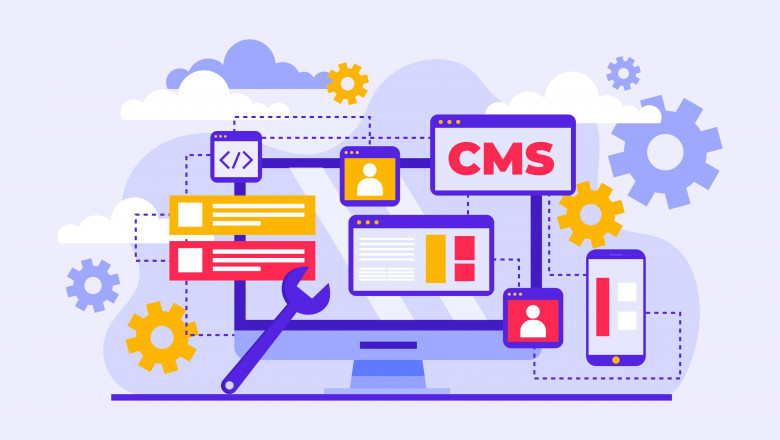views
In today's digital world, having a website is vital for businesses, organizations, and individuals alike since it acts as a trust and safety platform. However, developing a good website needs precise planning and attention. Before going into the website development process, several important factors must be addressed. In this article, we will look at 10 important factors to consider when creating a website.
10 Important Factors to Consider When Creating a Website
1. Define your Website's Purpose and Goals
Before beginning any website project, it is critical to determine the purpose and goals of your website. Ask yourself what you want to accomplish with your website. Is it to promote your products or services, provide information to your target audience, create leads, or sell online? Having a clear idea of your website's goal can help you make decisions during the development process.
2. Identify your Target Audience's Needs
Understanding your target audience is critical in creating a successful website. Determine the characteristics and demands of your ideal visitors or customers. Conduct market research and learn about their demographics, interests, and online activity. Knowing your target audience allows you to customize your website's design, content, and functionality to match their individual needs.
3. Conduct Detailed Market Research and Competitive Analysis
Market research and competitive analysis are essential aspects in ensuring the success of your website. Analyze your industry, observe trends, and examine your competitors' websites. This study will assist you in identifying gaps and possibilities, enabling you to differentiate your website and provide a distinct value proposition. Use competitor's strengths and flaws to enhance your own website.
4. Select the Suitable Domain Name and Hosting Provider
Selecting a suitable domain name is critical since it represents your brand and directs consumers to your website. Select a domain name that is memorable, relevant to your business, and easy to remember. In addition, think carefully about your hosting provider. Make sure they provide dependable hosting services, appropriate storage and bandwidth, and excellent customer service.
5. Choose the Right CMS or Website Builder
A website builder, sometimes known as a content management system (CMS), makes it easier to create and manage websites. Choose a CMS or website builder that is compatible with your technical abilities, budget, and website needs. WordPress, Joomla, and Drupal are popular CMS solutions, while website builders such as Wix, Squarespace, and Shopify provide beginner-friendly interfaces.
6. Plan your Website's Navigation and Structure
A well-structured website with simple navigation is essential for delivering a smooth user experience. Plan your website's structure by categorizing content and setting page hierarchy. Use clear and detailed labels for navigation menus, as well as a search option, to assist users in discovering relevant information quickly.
7. Develop a Visually Appealing and User-friendly Design
The design of your website is crucial in attracting and maintaining users, as well as providing content management. Create a visually attractive design that is consistent with your brand identity. Use the same colors, fonts, and images throughout your website. Make sure the design is user-friendly by including intuitive user interfaces, clear calls-to-action, and easy-to-read text.
8. Check for Mobile Responsiveness and Cross-Browser Compatibility
With the growing usage of mobile devices, it is critical to make your website mobile-responsive. Your website should be able to adapt and show appropriately across a variety of screen sizes and resolutions. Furthermore, test your website on many different kinds of browsers (e.g., Chrome, Firefox, Safari, and Edge) to ensure cross-browser compatibility and deliver a consistent user experience.
9. Optimize your Website for the Search Engines (SEO)
Search engine optimization (SEO) is essential for increasing your website's exposure in search results. Conduct keyword research to find relevant terms and phrases that your target audience is likely to look for. Incorporate these keywords organically into your website's content, meta tags, headers, and URLs. To boost your website's SEO performance, optimize its loading speed, and navigational structure, and generate quality backlinks.
10. Create a Content Strategy and Schedule Regular Updates and Maintenance
Developing interesting and educational content is essential to keeping website visitors engaged. Create a content strategy that specifies the kinds of content you will publish, how often you will update it, and the channels you will use to advertise it. To give your visitors useful content, think about adding a blog, news section, or resource library. Plan for regular backups, security updates, and continuous maintenance as well to guarantee your website runs smoothly.
Conclusion
Developing a successful website involves careful consideration of several factors. You establish the groundwork for a successful online presence by defining the objective of your website, knowing your target audience, performing extensive market research, and choosing the correct domain name, hosting provider, and CMS. Furthermore, establishing your website structure, designing it to be visually appealing and user-friendly, and optimizing it for mobile responsiveness and SEO are all critical stages toward meeting your objectives. Finally, creating a content strategy and implementing a maintenance plan helps assure the long-term success of your website. By addressing these critical features, you can develop a website that successfully represents your brand, engages your target audience, and meets your goals.






















Comments
0 comment